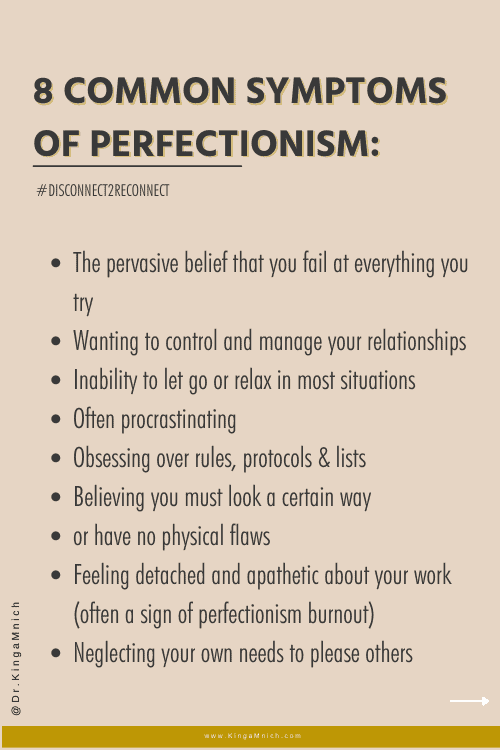And 4 steps to overcome the perfectionist trap
Are you afraid of failure? Are you holding back because you fear the outcome? Because you are secretly fearing being judged by others and losing face. Generally, it is essential to you how others perceive you, and if you are being honest with yourself, this is your biggest obstacle. On top of it, you feel a constant pressure to be perfect. Because it creates constant worries, anxiety, and can easily end in burnout and depression.
….And yet standing still without taking the next steps isn’t the answer either!
Men often take actions based on the motto “what does kill me makes me stronger”. As women, we tend to be more on the side of caution and calculated optimism – and there is nothing wrong with that. On the contrary, research has shown that women are better at investing money. A company with strong & capable female leadership is not just more stable but also survives crises better. Yes, they might not have such aggressive revenue, but the return to investors isn’t everything, particularly when it comes to avoiding failure.
The question, when it comes to high-achieving perfectionism, is: how do you balance your wisdom, goal setting, insecurity, knowledge, and fear, within the parameters of society’s expectations?
“Cautious or thoughtful behavior only becomes a problem when it actually is hidden perfectionism.”
Table of contents
Perfectionist trap and what is perfectionism?

According to an article in GoodTherapy, Perfectionism is often defined as the need to be or appear to be perfect, or even to believe that it’s possible to achieve perfection. There are generally 3 different forms of perfectionism: self-oriented,other-oriented, and socially-prescribed perfectionism. The first one describes the characteristics of believing that you need to be flawless. The second describes a person who believes that others need to be perfect (insinuating that he or she is also perfect). The last one is an inner belief that the society around you, wouldn’t accept you if you were not perfect.
Generally, perfectionism describes a characteristic of striving for flawlessness and setting excessively high standards, accompanied by overly critical self-evaluations and worrying too much about what other people think of you. This comes down to frequent fear of disapproval from others or feelings of insecurity and inadequacy.
In psychology, we also refer to it as maladaptive perfectionism. It describes the unhealthy setting of unrealistic standards combined with harsh self-criticism and low self-esteem. The feeling of distress, anxiety and sometimes depression can result from low self-esteem.
Anxiety and perfectionism.
Anxiety can play a dynamic role in perfectionism as it can both be the cause and the result of it. Your upbringing and learned behaviors play a big part in developing individual perfectionist behavior. Nevertheless, in terms of moving forward, they don’t play such a significant role. As with most other habits and character traits, it is important to recognize these and understand that you are not necessarily the expectations you have been exposed to.
What matters is to understand how you are feeling in the moment when you recognize that perfectionism is kicking in. The official story that a perfectionist tells herself is that if it is not perfect it is not worthy. But this completely ignores the fact that ideas and concepts evolve and are dynamic. The moment you understand this concept, your mind has shifted from high-achieving perfectionism to healthy thriving.
That doesn’t mean that every high performer is a perfectionist. But unfortunately, high-achievers are at risk of turning into perfectionists.

Let’s dismantle perfectionism for everyone that believes in perfectionism as a path to success.
In reality, there is no such thing as perfection. The reason for that is quite simple, firstly: what might seem perfect to you, doesn’t have to be perfect for someone else. Secondly, everything around us changes. So, what might be perfect now, won’t be perfect in the next moment. And that is precisely the trap that perfectionists fall into.
Remember when you were writing a paper for school, and you were working so hard on it. Just to reread it at the end and come up with a million new ideas and ways to make it better? Finally, handing in that paper or thesis became so complicated. And today, in school or when you are working for someone else you have to follow deadlines and hand in your work on time – no matter what. These deadlines exist not just to achieve goals but also because we all know the perfectionist trap is real.
Overcoming perfectionism as an entrepreneur.
But, if you work for yourself or are trying to achieve something just for yourself, you don’t have any external pressure and are, therefore, more prone to the perfectionist trap. While pressure, in general, might not be pleasant, at times it can be very effective in avoiding that trap. Step one in overcoming perfectionism is setting hard deadlines for yourself is one of the biggest mind tricks to help you avoid procrastination and perfectionism.
Remember, perfectionism is just the illusion of creating something worthy of being admired and recognized by the people around you. Therefore, it is often simply a desire for recognition and admiration…or an excuse not to put anything out there because you worry it isn’t yet worthy enough to see the light of this world. You fear that others won’t recognize it, that you won’t be acknowledged or, even more so, that you won’t receive the love you desire from others.
Perfectionism has one big problem: It is all about the end product and not the path! And this really takes out all the fun and creativity.
The root cause for perfectionism.
Perfectionism can be caused by early childhood experiences, such as having parents with unrealistically high expectations, growing up as an immigrant, refugee, or in a surrounding in which you don’t feel like you belong can play a significant role. In addition, other factors such as mental health conditions, including obsessive-compulsive disorder (OCD), can foster perfectionist tendencies – Really anything that furthers the fear of judgment or disapproval from others.
And this just brings us back to the basic rule that it is vital to become aware of the emotions that are involved in this process—stepping aside and starting to observe what you are feeling instead of identifying with your emotions. So, for example, just because you feel like you have failed, doesn’t mean that you are a failure.
Feeling of Failure.
The feeling of failure and disappointing others represent two of the strongest impulses for perfectionist behavior.
The first step in overcoming perfectionism is to change your understanding of failure. Personally, as someone who has grown up with very high expectations, I had to learn to let go of the belief that anything can be achieved if you are willing to work hard. While I still believe that any goal that you set yourself can be achieved, I have also learned that it takes courage to make mistakes so you can actually learn what it takes to achieve these goals.
Success results from a chain of unsuccessful attempts and can be solemnly reached through consistency and grid. Changing your perception of failure is the mental component in the process of letting go of your perfectionistic tendencies.
Perception of failure.
Avoiding failure is a matter of perception and setting achievable goals. On the other hand, when you set unattainable goals or don’t give yourself enough time to achieve your goals, you will create the feeling of failure. Another issue with failure is that too often a fixed mindset kicks in when working on goals. Meaning you start seeing just two options: achieving a goal or failing. There is no middle ground in a fixed mindset.
This is how you set yourself up for failure:
- Setting unmeasurable goals
- Not giving yourself enough time to succeed
- Trying to skip essential steps
- Try to find shortcuts
- Focusing on the wrong things, and
- Trying to be perfect!
But life is about learning and evolving. It is about making mistakes to learn from them. The greatest innovations have been accidental failures that turned out to be brilliant.
Adjusting goals over time is the most effective way to stay motivated and on track to turn your big crazy dream into reality.
Steps to embrace failure and let go of perfectionism.
- First and foremost – go out and fail.
Create one day a month in honor of failure and do something that you know you are not good at, and celebrate each moment of it. Sounds crazy? Might be, but the only way to get comfortable with discomfort is by actually allowing yourself to feel the emotion of it.
- Don’t be afraid of thinking big.
- Give yourself confidence that your concepts are good enough to see the world.
- Put your ideas out there and test them. Life is a learning experience.
- Start immediately – now is the time to make the impact you are meant to make.
- Stop looking for excuses for why you haven’t finished your project or task.
Isn’t it much scarier to imagine yourself waking up one day at the end of your life and realizing that you haven’t done the things that you had dreamt of doing? That you have failed to be impactful? And yet you don’t lack ideas. Most likely, you just don’t know which of your ideas is good enough. But you will never know if you don’t start taking action and testing the water.
Identify the action that you need to take through your emotions. Don’t make a pro and con list, rather make a list of how it will make you feel if you don’t step out of your comfort zone. This is usually the trick for anyone who is successful in feeling the fear and doing it anyway.
It’s not about achievements -it’s about moving forward.

At times we forget that it is not about the models on our wall, the certificates, and recognition. It is about you and how you are feeling on your path. Your path is a discovery process, and your goals can change along the way. Everything that you are doing is a learning process, and the only way you can succeed is when you are open to learning. This mindset shift is step 3 on your perfectionist recovery journey.
Once you have mastered the first 3 steps, the last two will come with much more ease.
Setting goals!
As a high-achiever, you want to be able to measure your success and see that you are moving forward. Setting attainable, timely, and measurable goals helps you recognize how far you have come and the work you have done.
I had a client once tell me that his goal for his company was to hit $1 million in revenue. He just simply had to prove to his family that he was able to do it. Fair enough, but in reality, he didn’t even make $10.000 yet. While his goal was certainly something that could become a reality, it was essential for him at that moment to slow down and break down this goal into steps that would elevate him toward achieving his goal.
Perfectionist tendencies far too often set you up for failure by making you believe that just big goals are worthy of your focus. As a perfectionist, you might tend to believe that you are highly talented and it is your calling to achieve extraordinary things in life.
High achievers certainly do accomplish extraordinary things. But they are focused on the path and not on the end goal. The end goal is just the result of a carefully outlined structure and strategy. And they never fail to celebrate other people’s success, as well as their own.
This brings me to the last step of recovering from perfectionism:
Fulfillment.
Celebrate every achievement and every moment of success. This simply allows you to foster a growth mindset and be more in the moment, which inherently reduces stress and helps you to stay motivated. It also helps you to have a healthy, realistic understanding of the timeline it takes to create the success you are thriving for and be a healthy thriver instead of a high-achiever with perfectionistic tendencies.
Feel free to let me know how your journey of letting go of perfectionism is going, by either connecting with me on Instagram or LinkedIn or feel free to connect me via email.
Looking for a speaker for your company, feel free to reach out to me and discuss possible topics.
‘Give yourself permission to see that life is changing on a regular basis.’
Here are some additional resources on perfectionism, what causes it, signs of perfectionism.
- Flett, G. L., Heisel, M. J., & Hewitt, P. L. (2014). The destructiveness of perfectionism revisited: Implications for the assessment of suicide risk and the prevention of suicide. Review of General Psychology, 18(3), 156-172. doi:
- Hasse, A. M., Prapavessis, H., & Owens, R. G. (2013, June 24). Domain-specificity in perfectionism: Variations across domains of life. Personality and Individual Differences, 55(2013), 711-715. Retrieved
- Rettner, R. (2010, July 11). The dark side of perfectionism revealed.
- The Difference Between Perfectionists & High Achievers
- Scutti, S. (2014, September 26). Perfectionists, especially doctors, architects, and lawyers, are at higher risk of suicide.
- Szymanski, J. (2011, October 3). Perfectionism: Healthy or hurtful?
- 6 Differences Between Healthy High Achievers and Perfectionists — Which Are You?
- Perfectionism Can Become a Vicious Cycle in Families












